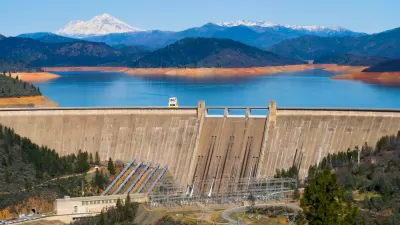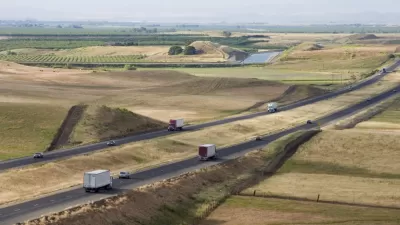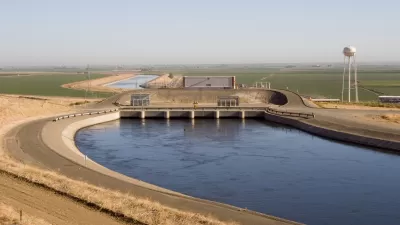Laura Bliss provides a summary of the controversy surrounding plans to bring the "Slide the City" event to Temple Avenue in Downtown Los Angeles.
Slide the City is based on the "Park and Slide" idea first implemented by Bristol in the United Kingdom. According to Bliss, an online petition to nix the idea for drought-stricken Los Angeles gathered 10,713 signatures and a related hashtag, #droughtshaming, provided a vessel for the message to reach a wider audience of the water conservation-minded public.
As explained by Bliss, however, some in the media are pushing back on the droughtshaming meme, citing such relevant data as the 20,000 gallons of drinking water the event would have used—a precious amount of water to be sure, but also the same amount of water that evaporates from a single Los Angeles pool every year.
And while those pools are the property of private owners, this event would have taken place in public. Bliss cites Jon Christenson to make the point about the cost of sacrificing events such as Slide the City:
Jon Christensen, Editor of Boom, told KCRW that Slide The City reminded him of Ciclavia's community-building bike interventions. "We should be really careful about being perceived as against fun when we're talking about water conservation," he said. "If that message gets confused, we're in trouble." And, in an ever-hotter L.A., these sorts of questions will continue to be important long after Slide The City is over.
"To live well and pleasantly, we are going to need places to cool off, where we can gather socially and have fun and build community," he said. "Maybe it would be a good idea to lose some of the thousands of private pools instead, and build more public pools."
The event was eventually canceled, despite negotiations to recycle the water in nearby Griffith Park. Adrian Glick Kudler of Curbed LA reports on the final development in the defunct Slide the City proposal.
FULL STORY: In Los Angeles, Can #Droughtshaming Go Too Far?

Planetizen Federal Action Tracker
A weekly monitor of how Trump’s orders and actions are impacting planners and planning in America.

Restaurant Patios Were a Pandemic Win — Why Were They so Hard to Keep?
Social distancing requirements and changes in travel patterns prompted cities to pilot new uses for street and sidewalk space. Then it got complicated.

Map: Where Senate Republicans Want to Sell Your Public Lands
For public land advocates, the Senate Republicans’ proposal to sell millions of acres of public land in the West is “the biggest fight of their careers.”

Maui's Vacation Rental Debate Turns Ugly
Verbal attacks, misinformation campaigns and fistfights plague a high-stakes debate to convert thousands of vacation rentals into long-term housing.

San Francisco Suspends Traffic Calming Amidst Record Deaths
Citing “a challenging fiscal landscape,” the city will cease the program on the heels of 42 traffic deaths, including 24 pedestrians.

California Homeless Arrests, Citations Spike After Ruling
An investigation reveals that anti-homeless actions increased up to 500% after Grants Pass v. Johnson — even in cities claiming no policy change.
Urban Design for Planners 1: Software Tools
This six-course series explores essential urban design concepts using open source software and equips planners with the tools they need to participate fully in the urban design process.
Planning for Universal Design
Learn the tools for implementing Universal Design in planning regulations.
Heyer Gruel & Associates PA
JM Goldson LLC
Custer County Colorado
City of Camden Redevelopment Agency
City of Astoria
Transportation Research & Education Center (TREC) at Portland State University
Camden Redevelopment Agency
City of Claremont
Municipality of Princeton (NJ)





























